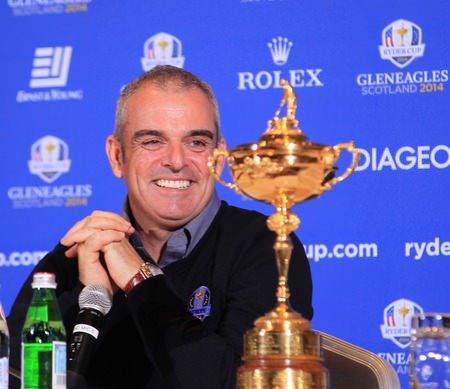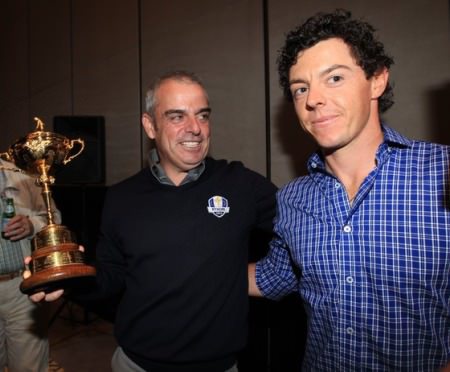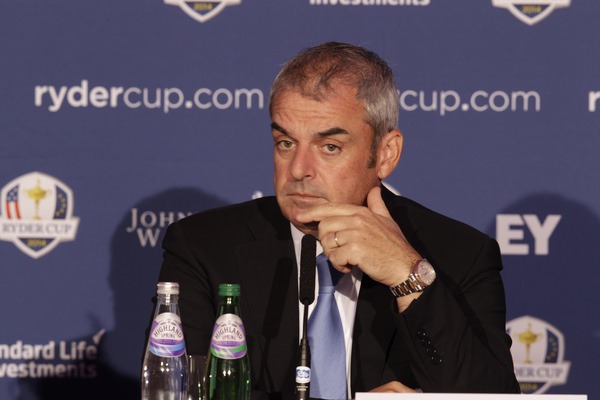Slow burner McGinley takes the Ryder Cup torch

Paul McGinley is the first Irishman to captain a European Ryder Cup team. Picture Stuart Adams www.golftourimages.com
When Paul McGinley writes his autobiography, put me down for two copies. Europe’s 2014 Ryder Cup captain will have some stories to tell and lessons to impart on despair, potential, frustration, exhilaration, learning and leadership.
Elected “unanimously” by his peers in Abu Dhabi on Tuesday, the first missives about the 46-year old Dubliner’s appointment are peppered with words and phrases such as “politician”, “quiet approach”, “outflanked”, “strategy”, “dignified” and “muttering campaign” that summed up a painful process for all involved.
He crossed the line a clear winner following a selection process that was described by The Guardian’s Ewan Murray as “deeply flawed”, and one that “leads to the kind of murky political chicanery that is unbefitting of such a coveted role.”
Barring a remarkable turnaround in his playing fortunes - more remarkable than the way he overcame what some observers believe was opposition from the tour mandarins and outmanoeuvred Darren Clarke and then Scotland’s Colin Montgomerie to earn the captaincy in the Home of Golf, no less - this will go down as McGinley’s major.
Win or lose against his boyhood hero Tom Watson at Gleneagles in late September next year, McGinley’s is the story of a slow burner who watched, listened and learned before choosing his moment and executing his plan.
Clearly the outstanding candidate for the job in terms of his ability to captain, it was no great surprise that he needed a final push from the world No 1 to get him over the line. He crossed it like Eamon Coghlan, clenching his fists in delight as the rounded the final bend in the 1983 5,000 metre final, when Rory McIlroy put the final nail in Montgomerie’s coffin at Monday’s Nike launch with an impassioned call for McGinley as skipper.
Faced with a player rebellion if they overlooked McGinley in favour of Montgomerie following those unequivocal messages of support from the backbone of the team that won at Medinah - McIlroy, Ian Poulter, Justin Rose and Luke Donald - the pieces fell into place following an hour long meeting at a plush Abu Dhabi hotel.
It’s a “victory” that will overshadow anything McGinley has ever achieved on the golf course - the champagne cork popping moment when he sank the winning putt at The Belfry in 2002, that remarkable recovery from knee surgery to win his Ryder Cup place in 2004 or the sensational run of form he produced in 2005 to make sure he won a third cap at The K Club the following year.
Rory McIlroy congratulates Paul McGinley on his appointment as Ryder Cup captain. Picture: Fran Caffrey/www.golffile.ieOvershadowed by the imperiously talented Darren Clarke as an amateur and a professional, his playing exploits will almost certainly be consigned to the footnotes of Irish golfing history by the major-winning achievements of the Dungannon man, his close friend Pádraig Harrington and the new superstars of Irish golf that are McIlroy and Graeme McDowell.
Few will remember that McGinley played in the group in front of Harrington (the penultimate two-ball) in that unforgettable Open Championship the Dubliner captured in such incredible fashion at Carnoustie in 2007.
Few people know McGinley as well as Harrington - the three time major winner is five years his junior yet the attended the same school and won the World Cup for Ireland in 1997 - who almost covered his eyes when he saw that the 2002 Ryder Cup at The Belfry rested on the putting prowess of his good friend.
Had he been “blessed” with a streaky putting game, McGinley would almost certainly have won more than four times on tour and captured the PGA and the World Match Play at Wenworth in 2005 before he eventually captured his biggest win at the Volvo Masters later that season.
When he missed the cut in the final counting event for the 2004 Ryder Cup in the US with place on the team not yet secure, his coach Bob Torrance summed up the McGinley’s “close but no cigar” persona brilliantly - “Paul’s the type of guy who thinks that coconuts only fall on him.”
Not this time.
Those who scoff at McGinley’s achievements on tour may not readily recall that he did not turn professional until he was 26 and only earned a golf scholarship to the University of San Diego through the kind of interpersonal skills that played such a huge part in his elevation to the Ryder Cup captaincy.
“I wasn’t one of the star amateurs. I wasn’t on the Irish team and barely on the Leinster team. I had just come back from working in Brussels. I applied for all the Universities in America and nobody offered me a scholarship. I was a walk on. You pay your own way. The coach promised me that if I played well the first year he would give me a scholarship the second year. That was my best offer and it was going to cost IR£8,000. I got a grant of IR£5,000 through Pádraig (O’hUigin) and loan of IR£5,000 from the Bank of Ireland in Whitehall, which my father guaranteed for five grand. And I went away with two grand in the bank. That was my airline tickets and my living expenses. It was one of the first years of the Team Ireland Trust. Sonia O’Sullivan was there too.
“The coach was Gordon Severson. I owe Pádraig a lot. I had to give a presentation to them and show accounts and letters from coaches. It was a very professional interview I had to do. They granted me the money and I went there in 1990. Christmas 1989. Darren had just turned pro as well. End of ‘89 beginning 1990.”
Transformed in the US, he played in the 1991 Walker Cup at Portmarnock, teaming up with Liam White to beat Bob May and a young superstar called Philip Mickelson.
He turned professional at the end of 1991, earning his card at the Q-School before going on to win four events and rack up another 15 second place finishes between 1993 and 2008, when his multiple knee surgeries began to take their toll.
Pádraig Harrington was delighted for Paul McGinley. Picture: Fran Caffrey/www.golffile.ie..When he holed that 10 foot putt to win the 2002 Ryder Cup for Europe and leapt into the air, he described the feeling in such a wonderful way that the scribes should have no fear about his ability to stand in front of a microphone and give them good stories over the next 20 months.
“Imagine I’m a big bottle of champagne and you’re giving me a good old shake. You’re shaking me and shaking me and the fizz inside is just bursting to get out. And then, when you finally pop the cork, the champagne explodes, the fizz shoots into the sky and everyone goes mad. That’s exactly how I felt when I sank the putt which won the Ryder Cup two years ago.
“I just wish everyone, at some point in their lives, could feel those same 30 seconds of sheer joy I had when the putt went in, my mouth fell open and I stuck my hands up in the air. Actually it was probably only five seconds before my team jumped on me. But it seemed as if the world simply stopped and there was nothing but this rush of emotion - joy, relief, adrenalin and excitement. Pure ecstasy.”
Des Smyth, the man who could have been captain at The K Club in 2006, spoke about McGinley shortly after that memorable moment:
“I like Paul’s story. It’s a story of great determination. He was a (country) member here (at County Louth Golf Club). There’s a picture of Paul in that room in there. I was away playing on Tour when he was young but I remember the guys telling me that he’d be down every Saturday to play in the winter league and before going out, he’d spend an hour on the range practicing before he played and two hours out there after he’d finished. So he was making a statement.”
Like Harrington, he is a naturally inquisitive individual though more outgoing than his younger friend.
A product of 1980s Dublin, he was a Stiff Little Fingers fan, he once paid 50p to watch a fledgling U2 perform at the old Dandelion Market at the top of Grafton Street and dreamed of being a Gaelic football star for the might Dubs before he smashed his knee to smithereens at the age of 19 and took to golf at Grange, that tight, strategic, James Braid gem in the foothills of the Dublin mountains.
“I had a real talent and would probably have made the Dublin team - which is the Gaelic football equivalent of playing for Manchester United or Arsenal,” McGinley recalled before the 2004 Ryder Cup in Detroit. “I was just one rung below that level when the knee got mangled. I was 19, on crutches for six months and out of the sport forever. I wasn’t much of a golfer then - playing off an eight handicap - but suddenly I could play golf for the whole year rather than just three months in the Gaelic off-season. I would’ve still loved to have played for Dublin before the 67,000 crowds they get most games. The Ryder Cup is the closest I’m going to get to that kind of fervour.”
An eclectic individual, he’s made no secret of the fact that Watson was his boyhood hero as he grew up in the 70’s and 80’s watching the American capture five Open Championships on TV.
A huge Celtic FC fan, he’s become close friends with a host of sporting giants in the game of golf as well as other disciplines such as GAA, soccer and motor racing. And he’s made it his business to learn from them.
For instance, former Formula One team boss Eddie Jordan was on his bag at the 2005 BMW International Open in Munich, where he finished sixth.
“I am sure a lot of people were thinking, what is he doing with Eddie Jordan on the bag,” he said at the time. “But we said at the start of the week, this is not a jaunt or doing a favour for a friend. This is to give me a little extra dimension… I don’t want to say too much, but he has managed everybody from Ayrton Senna to Michael Schumacher to Damon Hill - world champions - he has managed them all at different stages of their careers and I was able to feed off that.
“I have know Eddie for 20 years but I saw a little but of a different dimension from him this week and it was something that I really enjoyed. You are always learning in golf. You have to open your eyes to how successful people are doing and how they are going about it. You have to keep learning. No matter what business you are in.”
Colin Montgomerie checks his phone as he waits to find out if he has been named 2014 Ryder Cup captain. Picture Stuart Adams www.golftourimages.comTravelling home from the 2001 American Express Championship in San Francisco, he stopped off in New York to watch U2 play Madison Square Garden. Again, he was learning, observing.
“It’s the energy that they produce and the intensity. I was right up the front and there were four screens - one camera on each of them. You could see the level of energy and concentration that they produce. You can see why they are so successful and I’ve been a huge fan for years.”
At the 2005 Royal Trophy in Thailand, he had Seve Ballesteros, Nick Faldo and Ian Woosnam by his side, learned from them and used that experience to become a brilliant Seve Trophy captain in 2009, where he crucially won over the young McIlroy with his leadership skills. He was just as good in 2011, winning again with a weak team.
“You always see a different side to a person when you are in a team with them,” McGinley said of that 2005 Royal Trophy experience. “As much as you might think you know a person, you see a different side behind closed doors. Without saying too much about last week I saw a different side to all three of them. It was good because I have never played in a team with them before apart from with Woosie in the Seve Trophy at Druids Glen.
“It was a really good experience for me. It was more a sense of being on a level playing pitch with them. It was not the sense of having them up there as icons, as they were when I was growing up. I fell I was on a level playing pitch with them and all of us were pulling in the same direction.
“Seve said certain things about my game and I asked Faldo questions about his game and got answers. I know I got honest answers. It is not something I would do if I was playing against him in the Irish Open in the morning.
“When you are in a team and talking about strategy, you could ask him how he thought a certain hole should be played and ask him what he would do in playing that hole. You can’t really ask that when you are playing with somebody in a tournament. And if you do ask him you mightn’t get the right answer.”
As he approached his 40th birthday in 2006, he reflected on his career and how he regretted not starting earlier.
“I was 26 when I turned pro, which was really late. Not only that I was a late developer in terms of golf. At 21 I was not even scratch handicap so golf has come late to me. If I hadn’t gone into golf I would have fancied my chances in business. The way the Celtic Tiger has gone the last few years.
“That’s what I heading for. I have got a degree in international business and a diploma in marketing. I worked in Brussels for a year and learnt French to a pretty good standard. Now I have forgotten it all.
“I would have fancied my chances in business but having said that I wouldn’t have had the experiences I have had as a golfer. I read the financial papers and get the Wall Street Journal when I am away. I watch the stock market …”
McGinley’s wider world view has helped him get where he is today and it is ability to listened to people, absorb their ideas and then apply them to his own career that could prove to be Europe’s secret weapon in Scotland next autumn.
During the Turespaña Masters in February 1994, he had dinner with Jack Nicklaus, his son Jackie and Roddy Carr in Jerez.
“I want to speak to all the great players if I can, before it’s too late,” the then 27 year old Dubliner said at the time before revealing that he had fixed up practice rounds with Lee Trevino for the Open at Muirfield later that year. “I’d love to speak to Tom Watson next. Each one of them has something to say that I can learn from.”
McGinley’s 2009 Seve Trophy captaincy proved to be the week he won the 2014 Ryder Cup captaincy. Impressing a 20-year old McIlroy - another inquisitive, intelligent type with interests beyond the game of golf - as well as McDowell, Poulter, Donald and Rose, prevented a last minute “political coup” in the committee room.
“I’m very fortunate Rory, Ian Poulter and Graeme McDowell played under me as a Seve Trophy captain,” McGinley said. “If there is a good structure on the tour, it is with the Seve Trophy and with the legacy of that tournament. Seve was a guy I knew very well. I played under Monty, José María and Seve in team events so I’ve been fortunate with the experience I’ve gained under those captains.”
The meeting - and more of that later - was anything but comfortable for those present.
McIlroy’s twitter campaign proved crucial in the end.
“It would have been a backward step,” McIlroy said. “I’m absolutely thrilled for Paul. I’ve been saying all along that the captaincy should be a one-time only deal because there are so many candidates waiting for their chance.
“I’d like to think it means something when you’ve got players like myself, Ian, Luke and Rose all voicing their opinion, that our opinions are valuable, and that the decision would be based on that, at least to some extent. We’ll do our best for Paul. It might be billed as David versus Goliath but we’re so happy to have Paul as our captain.”
“Paul is the best captain I’ve ever played under, in the Seve Trophy or the Ryder Cup,” said McIlroy. “Sense has prevailed.”
As the Daily Telegraph’s Jamie Corrigan reported:
“This was no forgone conclusion, no matter how emphatically Bjorn chose to represent his committee’s decision. Montgomerie had a chance and only when the majority became obvious did the rest of the committee come on side. They could abandon the unwritten rule of reappointing a captain or put to one side the petty prejudices which threatened to drown out the urgings of McIlroy and Co. Yet McIlroy’s voice was deafening.
“I can guarantee Rory a wildcard for Gleneagles,” quipped McGinley, with the biggest grin an appointed captain has ever worn. “It would be a dark day for the European Tour if Paul hadn’t been selected,” said McIlroy. Politics lost. Europe won.”
It was also the day the slow burner outshone the razzle dazzle.









